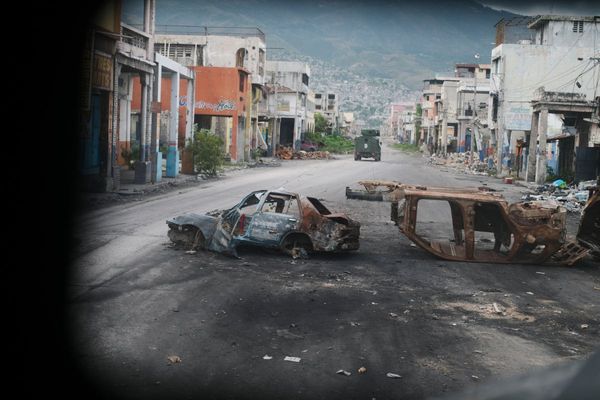
The thrill of reality TV has always been its escapism. Lately, though, I have been gobbling up a new crop of BBC reality shows, such as Ibiza Dreams and Inside Dubai: Playground of the Rich, which seem less about escapism than offering British people an exit plan. A similar story will become the basis for the upcoming BBC show Dubai Hustle, in which 20-something Britons compete to sell Dubai real estate. The contestants’ desperation to escape the UK’s “bleak employment prospects” – as the programme’s promotional material puts it – is being deployed to raise the TV stakes.
The dream these shows are selling is expatriation: to physically escape (preferably for ever) the UK. Dubbed “aspirational” within the TV industry, the programmes follow UK citizens who swap underpaid jobs in British supermarkets and call centres to pursue glamorous careers in places such as Dubai and Ibiza. In Inside Dubai, the BBC makes no mention of the city state’s well-documented use of slave labour, preferring to paint it as an Oz-like land of milk and honey – a place where you can hire a servant, or drink a cappuccino decorated with a foamy picture of your own face. A place where, if you are a clever expat, you can make tax-free millions doing strange and wonderful things such as selling truffles, or organising birthday parties for dogs.
The appetite for this type of programming reflects a very real lack of opportunity for young people in the UK, where 22% of 16- to 24-year-olds live in poverty , and high inflation means real wages are falling. What is striking about these shows is that they repackage that sense of hopelessness about UK employment prospects, and sell it as inspirational lifestyle TV. In Ibiza Dreams, we follow a group of Gen Z-ers as they try to become influencers, or “naked butlers”, or sell pictures of their feet online. This is really a story of economic precarity, about people born too late to experience security or progression in traditional industries, but it is told with a kind of relentless positivity. Even when the naked butler has to tell his own father he has started selling nudes for cash, it is framed as a canny business opportunity: “If you’ve got it, flaunt it.”
“Hustle culture” – the conviction that if you flaunt, and sweat, and graft enough, you can pull yourself up by sheer effort of will – is everywhere in these programmes. At points, the “hustle” is elevated into a kind of spiritual practice. In Ibiza Dreams, three would-be digital nomads downward dog at dawn in preparation for a hard day’s graft, and there is a lot of talk about the only barrier to success being “taking that mental block out”. A cursory glance at any ex-Love Islander’s Instagram reveals a similar faith in the power of said Love Islander’s mind to somehow commune with the universe and garner great wealth and happiness. Georgia Louise Harrison, a 2017 alumna of the programme with 1.1m Instagram followers, regularly posts about how “thoughts become things” – an idea popularised by the 2006 self-help book The Secret, which told readers that manifesting a new reality was “exactly like placing an order from a catalogue”.
Last week, it was announced that people on universal credit would be given just four weeks (down from three months) to find a job within their preferred sector. After that, claimants would be forced to take any job going – whether or not it’s beneath their qualification – or face having their benefits slashed. This means that unless you have family money or are already a high earner, that fantasy job is just getting further out of reach. Ibiza Dreams was filmed in 2019 but aired more than a year later, and watching the nomads and butlers chase the lives they want from a 2022 vantage point is moving. Daring to dream that you have some control over your circumstances is oddly courageous – particularly as the pandemic has only exacerbated dismal employment prospects for young people, with one in three 18- to 34-year-olds returning to atypical, often insecure work, and the number of economically inactive young men increasing by almost 50,000 since last spring, according to new data from the Resolution Foundation.
There have been points over the past two years when it has felt like we were in the grips of an existential reckoning about the role of work in our lives. Resignations and job-to-job moves in the UK were at their highest in 20 years, according to a report by the UK Labour Force Survey (LFS), and there were tenuous hopes that workers – inspired by the experience of furlough – might be abandoning the culture of productivity in favour of a new relationship with work and leisure, one that privileged time over money. But the hunger for shows like Dubai Hustle and Inside Dubai, which drew audiences of more than 2 million a episode, suggests a different story, one in which the spectacle of excess still functions as a bizarre appeasement for inequality, and Britons – crushed by the erosion of the welfare state and the rising cost of living – dream of fleeing the country. Of side-hustling away every spare hour and minute in the hope of a better life.
I saw a TikTok video a couple of weeks ago sincerely lamenting the death of the 9-5. In the post, which has received more than 200,000 likes since it was uploaded, @dawnpark rejects the pressure of hustle culture, with its compulsion to “make a living travelling and become financially free by the age of 30 etc”. It is interesting to me that to Gen Z, an eight-hour work day looks like a quaint, cosy relic from a kindlier age. The wheel has turned full circle. Perhaps the best we can hope for is a return to the 9-5.
Kitty Drake is a writer and editor based in London







